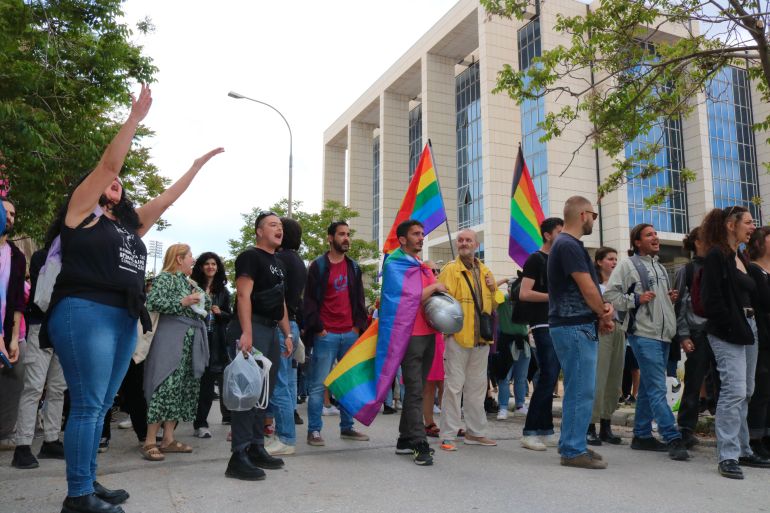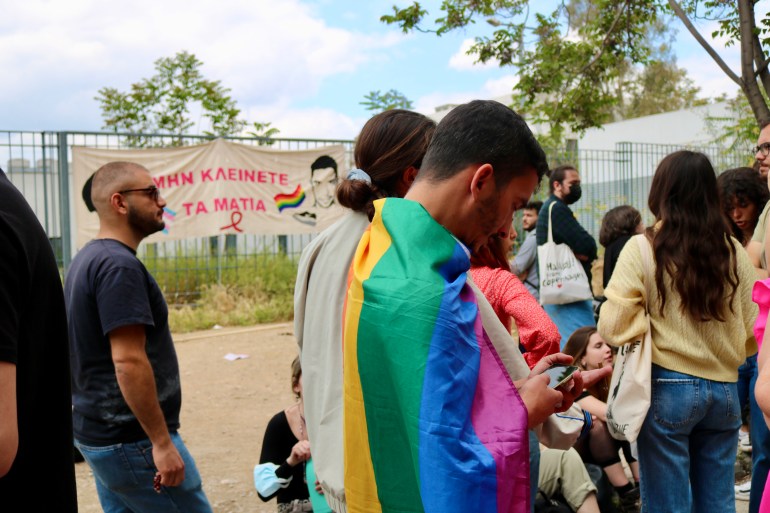Anger at Greek court verdict over LGBTQ activist killing
LGBTQ activists denounce acquittal of police officers who had been charged over killing of a queer activist in Athens.

Athens, Greece – A crowd gathered outside a court in Athens displaying banners, signs and rainbow flags as they awaited the verdict in a trial over the death of queer activist Zak Kostopoulos.
Kostopoulos, also known by his drag persona Zackie Oh, was beaten to death in central Athens in September 2018. After 18 court dates, the trial concluded on Tuesday.
Keep reading
list of 3 itemsGreece: Media freedom under assault
Greece, Norway order expulsion of Russian diplomats
Two men, Spyridon Dimopoulos, and Athanasios Chortarias, were found guilty of fatal bodily harm and sentenced to 10 years in prison. Four police officers who had been charged with fatal bodily harm were acquitted on all charges.
“This trial signals the ease with which the system denies our lives and their value,” said Alexandra Panagiotakopoulou, 28, an activist outside the court. “Essentially the message they will give in the end is they can kill us, and there will be no consequences for this. That the system doesn’t count us as people.”
Zak Kostopoulos was known throughout Greece for breaking taboos in speaking up about being HIV-positive, his history of drug use, and sex-positivity. But he was most famous for his infectious performances as drag queen Zackie Oh, often performing with a smirk across his face.
On the afternoon of September 21, 2018, Kostopoulos, for reasons that remain unclear, became locked in a jewellery store in central Athens.
Video of the incident shows him panicking, and attempting to exit through a broken window while two men, the jewellery store owner and a local real estate agent, kick him repeatedly as bystanders look on. Several police officers arrived at the scene, handcuffed the bloodied Kostopoulos, and continued to kick him. Kostopoulos died in an ambulance soon after.
In the days after the killing, video footage of the incident was broadcast on Greek television, with stations at first reporting that Kostopoulos had attempted to rob the jewellery store and died of a drug overdose. An autopsy later concluded that Kostopolos died due to an ischemic stroke directly caused by his injuries.
Throughout the court case, the defence argued that it was possible he did not die as a result of the beating, arguing perhaps he had drank too much the night prior, had taken too much ibuprofen, or perhaps was impacted due to his HIV status – all of which were rejected by the medical examiner.
The defence for the police maintained the officers acted properly and arrested Kostopoulos as was necessary, and did not contribute to his death.
The Kostopoulos family and their lawyer requested the prosecutor increase the charges for all the accused from fatal bodily harm to murder, and examine the possibility that there was a homophobic or other discriminatory motives behind the attack. Neither of these requests were granted.

“The accusation was not legally correct,” said Anny Paparousou, a lawyer for the family. “We did not have charges of homicide from the beginning.
But Paparousou’s greatest concern about the court’s decision was the lack of accountability for the police officers involved. She argued that the police handled Kostopoulos in the most violent way possible, fully aware of his injuries.
“[This decision] leaves the police unpunished, and this is a problem because in this way it gives full power to the police to treat any citizen they want in any way they want in whatever situation he is in,” she said.
The rights group Amnesty International has reported that there is a culture of abuse and impunity within the Greek police.
“It beggars belief that despite footage showing police using unnecessary force to arrest Zak while he lay dying on the ground, no officer has yet to be held to account,” Glykeria Arapi, Director of Amnesty International Greece said in a statement regarding the decision. “Today’s decision is yet another example in Greece where victims of unnecessary use of force and their families are left without justice.”
Queer activists across Greece have spent three years calling for “Justice for Zak/Zackie”- in demonstrations, discussions, graffiti, posters, art exhibitions, pamphlets, and drag shows from Athens to the islands.
But the verdict has left many accusing the Greek court system and society of unequal standards relating to the killing of a queer person.
“They do not consider our lives to have value,” said Panagiotakopoulou, “Unfortunately something like this had to happen for some people to wake up.”
Myrto Tsilimpounidi, a co-director of the Athens Feminist Autonomos Center for Research, pointed to the riots that erupted following the police killing of teenager Alexis Grigoropoulos in 2008.
“The last time that a cop faced legal consequences for killing a civilian, Athens was burning for 21 days. Of course, Alexis was a straight upper-class Greek adolescent,” she said.
The evening the decision was released, a demonstration of more than 1000 forged through central Athens, to the pedestrian road where Kostopoulos was killed. In the past three years dozens of demonstrations have similarly concluded below the street sign which has been painted over several times, renamed: “Zackie Oh Road”.
“On the one hand I was devastated, extremely angry, shocked, and very sad about the verdict,” said Importasou, an activist in the Justice for Zak/Zackie movement and friend of Kostopoulos, who asked to be referred to only by her chosen name.
“But when I arrived and I saw all these people, all this crowd with vivid colours on their face […] I was crying, I said that ‘we are here, we will not go back, we are going to fight, and everyone should know that Zackie is going to be here.'”
